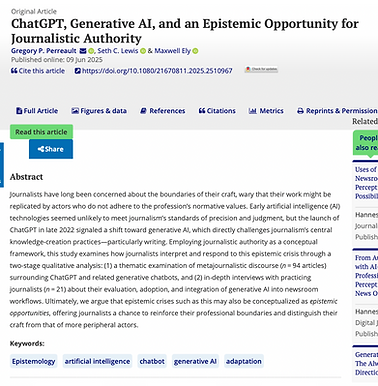Gregory P. Perreault
Sample Publications

"ChatBots as Artificial Intermediaries: implementation of artificial intelligence in newsrooms and hyped implications for news audiences." Journalism Studies.
Abstract: Journalists have long claimed authority regarding the distribution of valid knowledge and hence, discursively placed themselves in an intermediary role between audiences and the information they seek. Threats to this authority are not new, yet the threats posed by generative artificial intelligence offer a novel presentation of this threat: could the distribution of valid knowledge be replicated by chatbots? This study explores the discursive construction of artificial intelligence in four countries (Canada, Germany, UK, USA) through a dataset of metajournalism articles (n=177) produced in the early stages of ChatGPT 3.5. We find that journalists perceived potential and addressable pitfalls, in working with artificial intelligence but worried less about the implications for their audiences.
Below are a few recent, representative publications. For a more complete view of my research, please see my Google Scholar
"ChatGPT, Generative AI, and an Epistemic Opportunity for Journalistic Authority." Digital Journalism.
Journalists have long been concerned about the boundaries of their craft, wary that their work might be replicated by actors who do not adhere to the profession’s normative values. Early artificial intelligence (AI) technologies seemed unlikely to meet journalism’s standards of precision and judgment, but the launch of ChatGPT in late 2022 signaled a shift toward generative AI, which directly challenges journalism’s central knowledge-creation practices—particularly writing. Employing journalistic authority as a conceptual framework, this study examines how journalists interpret and respond to this epistemic crisis through a two-stage qualitative analysis: (1) a thematic examination of metajournalistic discourse (n = 94 articles) surrounding ChatGPT and related generative chatbots, and (2) in-depth interviews with practicing journalists (n = 21) about their evaluation, adoption, and integration of generative AI into newsroom workflows. Ultimately, we argue that epistemic crises such as this may also be conceptualized as epistemic opportunities, offering journalists a chance to reinforce their professional boundaries and distinguish their craft from that of more peripheral actors.


"Mitigating Hostility in Digital Journalism: Digital Hostility as Ossifier of Field Boundaries." Digital Journalism.
The rising prevalence of white nationalism necessitates an evaluation of the tactics of journalists employ to manage digital hostility. Through the lens of Bourdieu’s field theory, the present study reflects a two-step interview procedure with 31 North American journalists, followed by participant observation and long-form depth interviews with four North American audience editors. The study argues that managing hostility is rooted in the habitus of North American journalists, with audience editors in particular offering layered mitigation tactics that work like second nature. Yet this mitigation hardens field boundaries and discourages journalists from digital connection with audiences.



